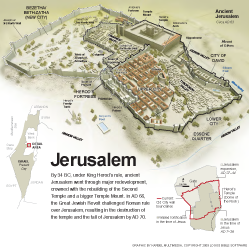48:title–14 This song of Zion (Pss 46; 76; 84; 87; 122) focuses on praising Yahweh and His city. (Zion is the temple mount in Jerusalem and is virtually synonymous with Jerusalem itself.) The psalmist begins by asserting the greatness of Yahweh and his city, Zion (vv. 1–3), describing how enemy rulers turned away and fled at the sight of it (vv. 4–8). He praises God directly for His steadfast love and name (vv. 9–11). The psalmist then encourages people to examine the defenses of Zion and recognize them as a symbol of God’s divine protection (vv. 12–14). |
48:title the sons of Korah See note on 42:title.
48:1 Yahweh is great While much of the psalm focuses on Zion, Yahweh’s holy mountain, it begins with praise to Yahweh for His greatness (using the Hebrew word gadol).
The term gadol essentially means “large” or “massive.” When applied to God, it usually refers to His great power to save (Deut 4:37; Neh 1:10) or to create (Jer 27:5). It can also apply to His great love, loyalty (1 Kgs 3:6), or wrath (Deut 29:28). The psalmist often uses it to describe God’s superiority over other gods (Ps 95:3; 96:4; 135:5). |
the city of our God Refers to Jerusalem, which became the capital of Israel during David’s rule (2 Sam 5:6–10). Since the temple—the symbol of divine presence—was located in Jerusalem, the city became the center for Israel’s worship.
which became the capital of Israel during David’s rule (2 Sam 5:6–10). Since the temple—the symbol of divine presence—was located in Jerusalem, the city became the center for Israel’s worship.
in his holy mountain Refers to Zion, the mountain on which Jerusalem sits.
48:2 Beautiful in elevation Emphasizes Zion’s importance as Yahweh’s chosen location rather than its actual elevation, which is not particularly impressive—several other peaks in the area are higher.
48:3 God is in her citadels; he is known as a high stronghold God’s presence makes Zion a place of safety and security. See note on Ps 46:1; note on 46:5.
48:4–6 The psalmist describes the futile attempts of enemy nations to overthrow Zion. As soon as they see the city, they retreat in horror and amazement (Isa 13:8). |
48:7 the ships of Tarshish Refers to trading ships (1 Kgs 10:22). These ships often serve as symbols of human pride that fall under God’s judgment. See Isa 2:16 and note.
48:8 Yahweh of hosts The divine title yhwh tseva'oth (“Yahweh of hosts”) has military connotations. See note on Ps 24:10.
48:9 We have pondered your loyal love The psalmist has gathered with the faithful in the temple to consider God’s unfailing covenantal love (chesed). See 27:4 and note.
 Chesed Word Study
Chesed Word Study
48:10 to the ends of the earth God’s praise is not limited to Zion. Like His name, Yahweh, it extends to the ends of the earth (see note on 23:3).
48:11 Let Mount Zion rejoice The psalmist encourages Zion itself to rejoice in response to God’s righteous judgments. This verse is repeated in Psa 97, which celebrates God’s Kingship (see 97:8 and note).
48:12–14 The psalmist encourages worshipers to walk around Zion |

|
About Faithlife Study BibleFaithlife Study Bible (FSB) is your guide to the ancient world of the Old and New Testaments, with study notes and articles that draw from a wide range of academic research. FSB helps you learn how to think about interpretation methods and issues so that you can gain a deeper understanding of the text. |
| Copyright |
Copyright 2012 Logos Bible Software. |
| Support Info | fsb |
 Loading…
Loading…

